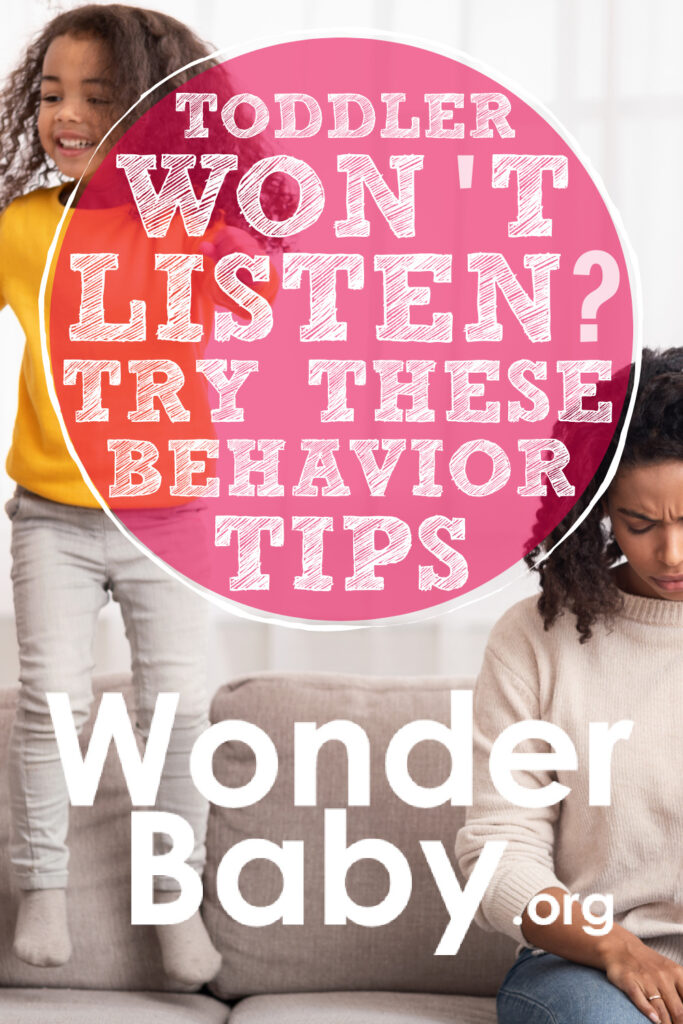Toddler Won’t Listen? Try These 11 Behavior Tips

- Not listening is normal toddler behavior. Yet all parents wonder why their toddlers ignore them sometimes.
- There are lots of reasons why toddlers don’t listen. Sometimes they might ignore you because they don’t want to do what you’re asking. Other times they may be so focused on what they’re doing that they don’t hear your voice.
- You can correct this behavior without punishing your toddler.
- Reframing this behavior may help you to respond more effectively. While it can be frustrating, your toddler asserting their independence is good.
- Your child is more likely to respond when you focus on what they can do rather than what they can’t.
It can be tough when your toddler won’t listen. This is especially true if you’re tired or are rushing to get somewhere. If you’re running on empty, you may not handle the situation as well as you would like. The key here is to have some tried and tested strategies you can use even when you’re not at your best.
The good news is that toddlers not listening is a universal experience. All toddler parents understand what you’re going through. Parents of older children have been there and done that.
My Toddler Won’t Listen: Is This Normal?
Yes, as a matter of fact, all parents of toddlers understand the frustrations of feeling ignored by their toddlers. Toddlers are constantly striving towards independence, which sometimes means they won’t listen to you. Sometimes, toddlers refuse to do something simply because you’re asking them to do it.
It can be incredibly frustrating to feel unheard, so you’ll be pleased to hear there are things you can do to get your toddler back on your side. For example, reflecting on how you speak to your toddler may help you improve your communication skills and avoid power struggles.
Reasons Why Toddlers Won’t Listen
There are many reasons toddlers don’t listen, and most are entirely normal. It would be unusual to get through the toddler stage without having phases of your toddler not listening. Even older kids will ignore you sometimes, and it can feel like a constant battle to be heard.
Your toddler might not listen because:
- Your toddler doesn’t understand the complicated words you’re saying.
- Your toddler is wrapped up in their play and can’t hear you. As a result, your toddler doesn’t want to do what you’re asking.
- You’re saying it wrong. If you say, for example, “Don’t touch that,” toddlers can hear “Touch that” and ignore the don’t part.
- Your toddler might ignore you if they’re in a bad mood. For example, if they’re tired, hungry, or overstimulated, you may find them less cooperative than usual.

Should You Discipline a Toddler Who Won’t Listen?
When you think of discipline, you probably imagine corporal punishment or a stern-looking army officer. Traditionally, discipline meant smacking or sending your child to their room as punishment for bad behavior; however, child psychology experts no longer recommend these methods.
One study found that children smacked at age three were more likely to suffer from behavioral problems and poor mental health over a decade later.
Luckily, discipline has changed, and it’s now possible to discipline without punishment. Positive discipline is the practice of teaching your kids how to behave without threats and punishments. Disciplining your toddler is necessary to help them understand which behaviors are unacceptable.
How Should You Respond if Your Toddler Refuses to Listen?
How you respond will likely depend on what you’re trying to get your toddler to hear. For example, you’ll probably react well if you’re having a leisurely afternoon at home after a good night’s sleep. On the other hand, if you’re an exhausted mess trying to rush out of the door for an appointment you’re already late for; you’re less likely to do your best parenting.
Unsurprisingly, our toddler will respond best to a calm but firm parent, so staying calm is essential even when you’re in a rush. Rushing your toddler will likely slow you down further as the battle for independence begins.
Reframing When Your Toddler Won’t Listen
One great way to help yourself parent positively is to reframe the situation. For example, rather than seeing your toddler not listening as your toddler being difficult, you could focus on the things your toddler is doing. For example, your toddler is being a toddler; striving for independence is a critical developmental stage for toddlers.
When your strong-willed toddler challenges you, they are allowing you to reinforce a boundary. Welcoming these moments as teaching opportunities will make you better able to remain calm. Your toddler will learn through repetition, so try to stay consistent each time your toddler challenges a boundary. See each challenge as a teachable moment and try to respond positively.

Helpful Ways to Encourage Your Toddler to Listen
Teaching children to listen is a crucial stage of parenting a toddler, and you’ll need to help them develop these essential life skills. Here are 11 strategies to add to your parenting toolbox to help you when your toddler doesn’t listen to you:
1. Stay Calm
Easier said than done sometimes, but staying calm is crucial when disciplining a toddler. If you are overly emotional or angry, your toddler will likely feel scared and unsettled without understanding what they’ve done wrong.
Take deep breaths and give yourself a moment before responding; this will help you to avoid an angry or emotional reaction.
Avoid using a negative tone; it won’t help to sound exasperated. You should use a firm voice, but there’s no reason to shout at your toddler (unless they are in immediate danger). Calm communication is easier for your toddler to understand. A firm voice is deep, calm, and confident.
2. Keep It Simple
Your toddler might seem like a genius, but their language skills are still developing. Toddlers don’t understand complex sentences and long words, so avoid these where possible. Some parents fall into the trap of talking too much when disciplining.
You don’t need to lecture your toddler. Instead, keep it simple to give your toddler the best chance of understanding your message.
3. Focus on the Do
Rather than telling your toddler what they can’t do, focus instead on the things they can do. This gives your toddler things they can do rather than providing rules to fight against.
If you can, do away with the word don’t all together. For example, instead of saying, “Don’t stand on your chair,” say, “chairs are for sitting.” Toddlers hear the word don’t a lot, so it becomes easy to ignore. Instead, focus on the do, and your child is more likely to follow your instructions.
4. Redirect Your Toddler
If your toddler is doing something you don’t want them to do, you can redirect them rather than focus on what they’re doing wrong. Redirection can change your child’s behavior without risking a power struggle.
For example, if your toddler is throwing wooden toys and you’re worried somebody might get hurt, you can offer them a ball while saying in a firm voice, “Balls are for throwing.”
5. Get Your Child’s Attention
If your toddler is busy playing, they may not have heard your request. Rather than getting mad, go over and get your child to focus on you before you start speaking. Crouch down to your toddler’s level, make eye contact, and say hi before repeating your request. This way, you’ll know they’ve heard you, even if they still don’t do what you’re asking.
6. Give Warnings
Many toddlers struggle with transitions. If your toddler ignores you when it’s time to leave the park, offering warnings might help. This will help your child prepare for the transition; you may find they cooperate more willingly after ample warnings.
Start with a five-minute verbal warning, “We’ll be leaving the park in five minutes. Is there anything you’d like to go on before we leave?” Follow this up with a second warning two minutes before and a third warning one minute before you need to leave
7. Offer Choices
Your toddler wants to be in charge of their own life. While you can’t offer them complete control, you can offer them choices throughout the day to develop their independence.
If your toddler ignores you because they don’t want to do what you’re asking, offer them a choice to sweeten the deal. For example, instead of “We’re leaving the park NOW,” try “It’s time to leave the park now. Would you like to walk or ride in the stroller?”
8. Use Positive Reinforcement
People react better to positivity than negativity, and toddlers are no different. Instead of focusing on the times your toddler won’t listen, positively reinforce the times they do.
“I loved how you put your coat on when I asked!” or “Good work tidying your blocks away when I asked.” Make a point of noticing when your toddler listens to what you say. Not only will this positively reinforce your toddler’s behavior, but it will also help you to see that your toddler listens to you lots throughout the day.
9. Be Realistic
Your toddler isn’t going to listen to you all the time. It’s normal for children to resist their parents sometimes, even in the toddler stage. Be realistic about what to expect from your child. Remember, toddlers are still learning how to behave.
Your job as a parent is to set boundaries and help your child meet them. Although, of course, your toddler isn’t always going to behave perfectly; this is a developmental stage of boundary testing and growing independence.
10. Give Your Toddler Plenty of Attention
Your toddler is hard-wired to please their caregivers. If you have a strong relationship, your child will be more willing to do as you ask. Giving your child your undivided attention each day could improve their behavior and encourage them to listen to you.
Carve out time each day to fully focus on your child. Leave your phone in another room, switch off any other devices and spend some time just the two of you. This positive attention will help you to reconnect and strengthen your bond, which should improve your child’s behavior and listening skills.
11. Model Active Listening
If you want your kid to listen, you need to show them how. If you often ignore your toddler because you’re engrossed in your phone, you will teach your child that ignoring people is okay.
Make a point of always talking back to your toddler, even when their communication skills are limited. Where possible, give them your full attention and make eye contact with them when they address you. This will help to develop their vocabulary and language skills and teach them how to be a good listener.
There are some great tips here to add to your parenting toolbox. Relying on a mix of the tips above, staying calm, and restating your boundaries should encourage toddlers to listen. Of course, it’s not always easy to get toddlers to listen, but you’ll be able to help them behave appropriately if you follow the tips above.
When to Seek Further Help
If you have concerns about your child’s hearing or behavior, it’s worth speaking to their pediatrician. Your toddler’s healthcare provider is best-placed to advise you on your child’s development.

Related Posts

Behavior
Understanding Intermittent Explosive Disorder in Children
Are you worried about your child’s unexpected aggression and explosive behaviors? Learn how to support a child with intermittent explosive disorder.

Behavior
5 Emotional Regulation Activities for Kids
Want to teach your child how to regulate emotions? Here are emotional regulation activities for kids that can help!

Behavior, Special Needs
5 Tips for Dining Out with Children Who Have Sensory Sensitivities
Worried about dining out with sensory sensitivities? Try these tips for less stress and more fun the next time you take your family out to eat.